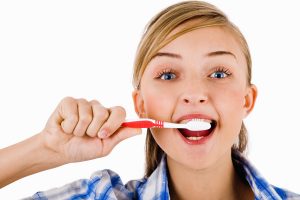 Oral Hygiene
Oral Hygiene
Great or excellent brushing and flossing habits contribute greatly to the success of your orthodontic treatment. When you get your braces and/or orthodontic appliances, a staff member will provide you with all the tools necessary to properly take care of your new appliances and show you how to use these tools effectively.
We recommend that you use an electric toothbrush to aid in the removal of food and plaque that adheres to braces after eating. The rotating/oscillating head mechanically removes food debris efficiently. We recommend that you brush your teeth after each meal and before bedtime. A travel toothbrush is recommended for brushing while at work or school. If you find yourself in a situation where you have eaten but there is nowhere to brush try rinsing with some water or chewing some sugarless gum (carefully!) to get rid of remaining bits of food. When you get home, brush your teeth with your electric toothbrush.
Flossing will remove food and plaque debris from between teeth. Flossing is recommended once a day. We recommend that you floss your teeth at the end of the day after homework and daily chores are complete! Flossing requires a few minutes of your time so it is best not to be rushed. “Floss Threaders” are little tools that assist in guiding the floss under the orthodontic wires to make flossing easier. “Superfloss” is floss that has a stiffer portion built into it and allows you to guide the floss under the wires. Either method works well.
Not taking the time to brush and floss properly will cause gums to become red and puffy and inflamed. This in turn can lead to periodontal (gum disease). It is more difficult to move teeth when gum tissue is inflamed and therefore orthodontic treatment time is increased. Your teeth will be affected as well. Permanent “white marks” will form around the braces where plaque was left. This is referred to as decalcification. These areas are weaker and more susceptible to cavities than areas that have been properly brushed.
Poorly brushed braces are difficult to work with and end up increasing office visit time when you come for your appointments. Halitosis (bad breath) is another result of poor brushing habits. Your brushing will be checked at each visit by the assistants and the dental hygienists. We are happy to take additional time to re-educate our patients on proper brushing/flossing techniques if you are having any difficulty. A score card indicating where improper brushing has taken place with instructions on how to improve will be given to any patient who requires additional help. Your general dentist will also be informed if extra cleaning visits are required.
Gum health is important and we take oral hygiene very seriously. The result will be healthy gums and teeth that free of white or brown marks and cavities!
Emergencies
- Call the office immediately to make an appointment – we have reserved time each day for people who have an emergency (please do not just show up).
- In the event that you are out of town or the office is closed, attempt to make yourself as comfortable as possible – place comfort wax on anything sharp. No wax? Try sugarless chewing gum for a quick fix!
- Larger sections of wire can be cut with a pair of nail clippers.
- If something comes loose, save it in a baggie and bring it with you to your emergency appointment.
- If you have fallen, been hit in the mouth, chipped a tooth or lost a tooth also call your dentist to check for fractures and tooth nerve damage.
- If none of these options work, you can call the Emergency Dental Clinic at 416-485-7121 for remedial emergency care. The charges for these emergency appointments are not included in the orthodontic fees.
 2825 Bathurst Street (storefront), Toronto, ON, M6B 3A4
2825 Bathurst Street (storefront), Toronto, ON, M6B 3A4